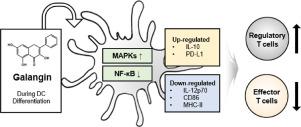The Journal of Nutritional Biochemistry ( IF 5.6 ) Pub Date : 2020-10-09 , DOI: 10.1016/j.jnutbio.2020.108524 Ha-Yeon Song 1 , Woo Sik Kim 2 , Jeong Moo Han 1 , Ho Seong Seo 2 , Seung-Taik Lim 3 , Eui-Baek Byun 2

|
Tolerogenic dendritic cells (tolDCs) can induce the differentiation of immunosuppressive regulatory T cells and are therefore candidates for the prevention or treatment of various inflammatory diseases. Galangin, a major component of propolis and Alpinia officinarum, has well-established anti-inflammatory effects, but its ability to induce a tolerogenic state in DCs has not been demonstrated. In this study, we investigated the effects of galangin on DC differentiation and immune responses. In particular, we compared phenotypic and functional differences between DCs (Gal-DCs) generated by galangin treatment during DC differentiation and bone marrow-derived DCs. Gal-DCs were generated by adding culture medium containing various doses of galangin (1.8–18.5 µM) on 3 and 6 day. Upon lipopolysaccharide (100 ng/mL) stimulation for 24 h, Gal-DCs generated with 7.4 µM galangin treatment showed lower levels of CD86 and lower major histocompatibility complex class II antigen-presentation than those of bone marrow-derived DCs. Furthermore, Gal-DCs showed markedly increased programmed death ligand 1 expression and IL-10 production via the activation of mitogen-activated protein kinases. Interestingly, Gal-DCs co-cultured with allogeneic CD4 T cells exhibited the reduced cell proliferation and differentiation into Th1-, Th2-, and Th17-type cell; instead, Gal-DCs contributed to the induction of CD4+CD25+Foxp3+ Tregs. Taken together, our data suggest that exposure to galangin during DC differentiation confers tolerogenic properties, efficiently inducing Th cell differentiation to immunosuppressive Tregs. These findings provide new insights into the molecular mechanism underlying the anti-inflammatory effects of galangin on DCs.
中文翻译:

树突状细胞分化过程中的高良姜素处理赋予响应脂多糖刺激的耐受性特性
致耐受性树突细胞 (tolDCs) 可以诱导免疫抑制性调节性 T 细胞的分化,因此是预防或治疗各种炎症性疾病的候选者。高良姜,蜂胶和山姜的主要成分, 具有公认的抗炎作用,但其诱导 DCs 致耐受状态的能力尚未得到证实。在这项研究中,我们研究了高良姜素对 DC 分化和免疫反应的影响。特别是,我们比较了在 DC 分化过程中由高良姜素处理产生的 DCs (Gal-DCs) 与骨髓衍生 DCs 之间的表型和功能差异。Gal-DCs 是通过在第 3 天和第 6 天添加含有不同剂量高良姜素 (1.8–18.5 µM) 的培养基产生的。在脂多糖 (100 ng/mL) 刺激 24 小时后,用 7.4 µM 高良姜素处理生成的 Gal-DCs 显示出比骨髓衍生的 DCs 更低的 CD86 水平和更低的主要组织相容性复合物 II 类抗原呈递。此外,通过激活丝裂原活化蛋白激酶,Gal-DC 显示出显着增加的程序性死亡配体 1 表达和 IL-10 产生。有趣的是,与同种异体 CD4 T 细胞共培养的 Gal-DC 表现出细胞增殖和分化为 Th1-、Th2- 和 Th17 型细胞的减少;相反,Gal-DC 有助于诱导 CD4+ CD25 + Foxp3 + Tregs。总之,我们的数据表明,在 DC 分化过程中暴露于高良姜素赋予了耐受性,有效地诱导 Th 细胞分化为免疫抑制性 Treg。这些发现为高良姜素对 DC 抗炎作用的分子机制提供了新的见解。



























 京公网安备 11010802027423号
京公网安备 11010802027423号